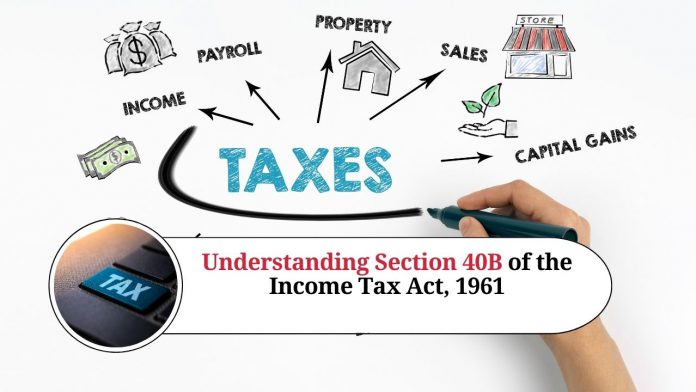Section 40B is a provision under the Income Tax Act that deals with the disallowance of interest on certain borrowed capital. The section applies to both individuals and companies who have borrowed capital and are claiming interest as a deduction from their taxable income.
Applicability of Section 40B
Section 40B applies to individuals and companies who have borrowed capital for business or profession. It is important to note that the borrowed capital must be used for business purposes only. If the borrowed capital is used for personal purposes or a non-business purpose, then the interest paid on such borrowing will not be allowed as a deduction from taxable income.
Carry Forward and Set-Off of Disallowed Interest
The interest on borrowed capital that is disallowed under Section 40B can be carried forward and set off against future business income. However, it cannot be set off against any other income such as salary, rent, or capital gains.
Example
Let’s take an example to understand how Section 40B works. Suppose a company borrows Rs. 10 lakhs to purchase machinery for its business. The company pays an interest of Rs. 1 lakh on the borrowed capital. In this case, the interest paid on the borrowed capital will be allowed as a deduction from taxable income because the borrowed capital is used for business purposes.
However, if the company borrows Rs. 10 lakhs to buy a residential property for its director, and pays interest of Rs. 1 lakh on the borrowed capital, then the interest paid on the borrowed capital will not be allowed as a deduction from taxable income. This is because the borrowed capital is not used for business purposes.
Final Conclusion
In conclusion, Section 40B of the Income Tax Act, of 1961, is an important provision that determines whether interest paid on borrowed capital can be allowed as a deduction from taxable income. Individuals and companies need to understand the purpose for which the borrowed capital is used to determine whether the interest paid on such borrowing is allowable as a deduction or not.
Read more useful content:
- section 145 of income tax act
- section 10e of income tax act
- section 9 of the income tax act
- section 94b of income tax act
- section 206aa of income tax act
Here are some frequently asked questions (FAQs) related to Section 40B of the Income Tax Act, 1961:
What is Section 40B of the Income Tax Act, of 1961?
Section 40B is a provision under the Income Tax Act that deals with the disallowance of interest on certain borrowed capital.
Does Section 40B apply?
Section 40B applies to individuals and companies who have borrowed capital for business or profession.
What is the condition for the allowance of deduction under Section 40B?
The interest paid on borrowed capital is allowed as a deduction from taxable income only if the borrowed capital is used for business purposes only, the interest is paid in the same financial year in which it is claimed as a deduction, and the interest is paid on the borrowed capital that is used for business purposes.
What happens if the borrowed capital is not used for business purposes?
If the borrowed capital is not used for business purposes or if the interest is paid on the borrowed capital that is not used for business purposes, then the interest paid on such borrowing will not be allowed as a deduction from taxable income.
Can the disallowed interest under Section 40B be carried forward and set off against future business income?
Yes, the interest on borrowed capital that is disallowed under Section 40B can be carried forward and set off against future business income. However, it cannot be set off against any other income such as salary, rent, or capital gains.
Is Section 40B applicable to personal loans?
No, Section 40B does not apply to personal loans. It applies only to borrowed capital that is used for business or professional purposes.
Can a company claim deduction under Section 40B for interest paid on capital borrowed for its subsidiary?
No, a company cannot claim a deduction under Section 40B for interest paid on capital borrowed for its subsidiary as it does not qualify as borrowed capital for business of the company.
What are the consequences of non-compliance with Section 40B?
If the interest paid on borrowed capital is claimed as a deduction in violation of the conditions specified in Section 40B, then the taxpayer may be subject to penalties and interest charges under the Income Tax Act. Additionally, the taxpayer may be required to pay back the disallowed deduction along with interest.
These were some common FAQs related to Section 40B of the Income Tax Act, of 1961. If you have further questions or need clarification, it is advisable to consult a tax professional.




















